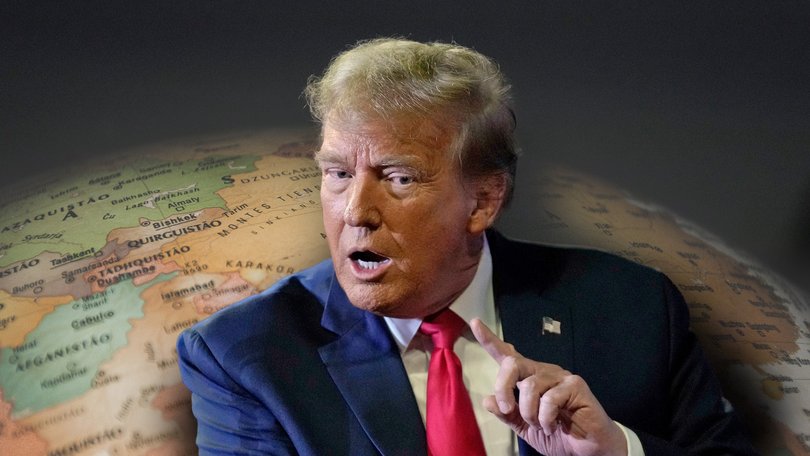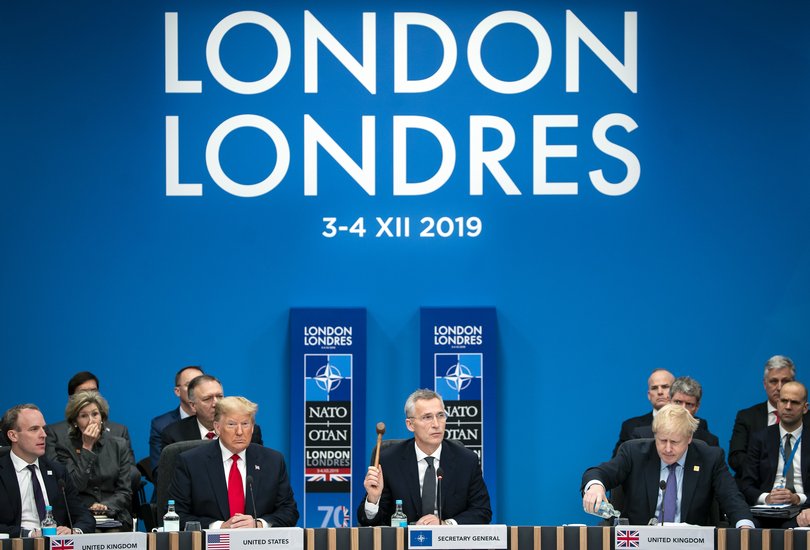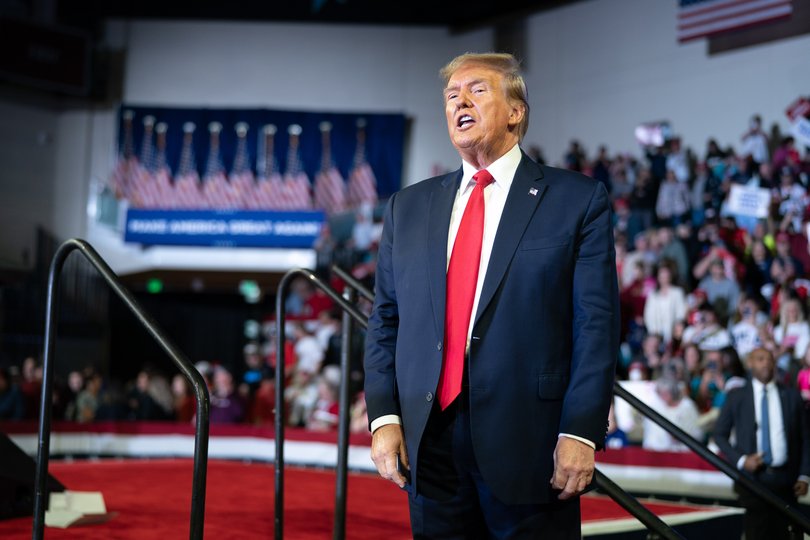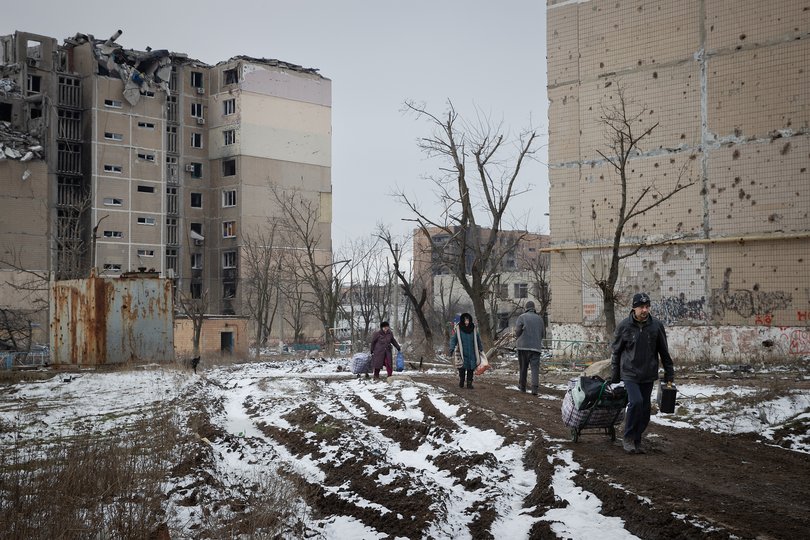The New York Times: Favouring foes over friends, Trump threatens to upend international order
Trump has never believed in the fundamental one-for-all-and-all-for-one concept of the Atlantic alliance. But he took it to a whole new level over the weekend.

Soon after former President Donald Trump took office, his staff explained how NATO’s mutual defense obligations worked.
“You mean, if Russia attacked Lithuania, we would go to war with Russia?” he responded. “That’s crazy.”
Trump has never believed in the fundamental one-for-all-and-all-for-one concept of the Atlantic alliance. Indeed, he spent much of his four-year presidency undermining it while strong-arming members into keeping their commitments to spend more on their own militaries with the threat that he would not come to their aid otherwise.
Sign up to The Nightly's newsletters.
Get the first look at the digital newspaper, curated daily stories and breaking headlines delivered to your inbox.
By continuing you agree to our Terms and Privacy Policy.But he took it to a whole new level over the weekend, declaring at a rally in South Carolina that not only would he not defend European countries he deemed to be in arrears from an attack by Russia, but he would go so far as to “encourage” Russia “to do whatever the hell they want” against them. Never before has a president of the United States — even a former one aspiring to reclaim the office — suggested he would incite an enemy to attack American allies.
Some may discount that as typical Trump rally bluster or write it off as a poor attempt at humour. Others may even cheer the hard line against supposedly deadbeat allies who in this view have taken advantage of American friendship for too long. But Trump’s rhetoric foreshadows potentially far-reaching changes in the international order if he wins the White House again in November with unpredictable consequences.

What’s more, Trump’s riff once again raised uncomfortable questions about his taste in friends. Encouraging Russia to attack NATO allies, even if he were not fully serious, is a stunning statement that highlights his odd affinity for Russian President Vladimir Putin, who has already proved his willingness to invade neighbouring countries that do not have the protection of NATO.
Long averse to alliances of any kind, Trump in a second term could effectively end the security umbrella that has guarded friends in Europe, Asia, Latin America and the Middle East for much of the nearly eight decades since the end of World War II. Just the suggestion that the United States could not be depended on would negate the value of such alliances, prompt longtime friends to hedge and perhaps align with other powers and embolden the likes of Putin and Xi Jinping of China.
“Russia and China have nothing to compare with America’s allies, and these allies depend on American commitment,” said Douglas E. Lute, a retired lieutenant general who served as ambassador to NATO under President Barack Obama and top adviser to President George W. Bush on the wars in Afghanistan and Iraq. “Casting doubt on the United States’ commitment to its allies sacrifices America’s greatest advantage over Russia and China, something that neither Putin nor Xi could achieve on his own.”
Undeterred by criticism of his latest comment, Trump doubled down Sunday.
“No money in the form of foreign aid should be given to any country unless it is done as a loan, not just a giveaway,” he wrote on social media in all capital letters. “We should never give money anymore,” he added, “without the hope of a payback, or without ‘strings’ attached.”
Trump has long threatened to withdraw the United States from NATO and would no longer be surrounded by the kind of advisers who stopped him from doing so last time. He tried to pull U.S. troops out of Germany at the end of his presidency in anger at Angela Merkel, then the chancellor, a withdrawal that was prevented only because President Joe Biden came to office in time to rescind the decision.
At other points, Trump contemplated pulling U.S. troops out of South Korea as well, only to be talked out of it, but has said since leaving office that such a move would be a priority in a second term unless South Korea paid more in compensation. Trump would also probably cut off military aid to Ukraine as it seeks to fend off Russian invaders, and he has offered no support for more aid to Israel in its war with Hamas.
History suggests this could result in more war, not less.
Foreseeing the possibility of an American retreat from the world if Trump returns to office, Congress recently passed legislation banning any president from withdrawing from the NATO treaty without Senate approval. But Trump would not even need to formally quit the alliance to render it pointless.
And if the United States could not be counted on to come to the aid of partners in Europe, where it has the strongest historic ties, then other countries with mutual security agreements with Washington such as Japan, the Philippines, Thailand, Australia, Argentina, Brazil, Chile, Colombia, Costa Rica and Panama could hardly be sure of U.S. help either.

Peter D. Feaver, a Duke University professor and former national security aide to Bush and President Bill Clinton, said Trump could reduce U.S. troops in Europe to a level that “would render any military defence plans hollow” and “regularly poor-mouth the U.S. commitment” in a way that would convince Putin that he has free rein.
“Just doing those two things could wound and perhaps kill NATO,” Feaver said. “And few allies or partners in other parts of the world would trust any U.S. commitment after seeing us break NATO.”
History suggests this could result in more war, not less. When Dean Acheson, the secretary of state, described an American “defensive perimeter” in Asia in 1950 that did not include South Korea, North Korea invaded five months later, starting a bloody war that nonetheless pulled in the United States.
The signal from Trump to NATO allies such as Poland, Finland, Estonia, Latvia and, yes, Lithuania is that they could be on their own by January. Coming just days after Putin told Tucker Carlson that Poland was at fault for Adolf Hitler invading it in 1939, the mood in the country could hardly be more unsettled.
“Article 5 has so far been invoked once — to help the U.S. in Afghanistan after 9/11,” Radek Sikorski, the foreign minister of Poland, noted in an email exchange Sunday. “Poland sent a brigade for a decade. We did not send a bill to Washington.”
The scorn for NATO that Trump expresses is based on a false premise that he has repeated for years even after being corrected, a sign that he is either incapable of processing information that conflicts with an idée fixe in his head or willing to distort facts to suit his preferred narrative.
As he has many times, Trump castigated NATO partners that he called “delinquent” in paying for U.S. protection. “You’ve got to pay,” he said. “You got to pay your bills.”
In fact, NATO partners do not pay the United States, as Trump implied. NATO members contribute to a common budget for civilian and military costs according to a formula based on national income and historically have met those obligations.
What Trump is referring to misleadingly is a goal set by NATO defense ministers in 2006 that each member spend 2% of its gross domestic product on its own military, a standard ratified by NATO leaders in 2014 with the aspiration of achieving it by 2024. As of last year, just 11 of the 31 members achieved that level, and last summer NATO leaders pledged an “enduring commitment” to finally reaching it. But even those who have not do not owe money to the United States as a result.
Among the members that do spend 2% of their economic output on defense are Poland and Lithuania, and the number has risen in the past two years after Russia’s invasion of Ukraine, which is not a NATO member. Other nations have pledged to increase spending in the next few years.
NATO spending is a legitimate concern, according to national security veterans, and Trump is not the first president to press NATO partners to do more — Bush and Obama did as well. But Trump is the first to present the alliance as a sort of protection racket where those who do not “pay up” will be abandoned by the United States, much less subject to attack by Russia with Washington’s encouragement.

“The credibility of NATO rests on the credibility of the man that occupies the Oval Office, since it’s the decisions taken there that in a critical situation will be decisive,” said Carl Bildt, a former prime minister of Sweden, which is completing its accession to NATO as the 32nd member.
“This applies to what could be crisis management in a minor engagement of some sort to the ultimate issue of the nuclear deterrent,” he said. “If Putin threatened nuclear strikes against Poland, would Trump say that he doesn’t care?”
Trump’s fixation on being paid by allies extends beyond Europe. At one point he assailed the mutual defense treaty with Japan that has been in force since 1951 and at other points he prepared to order U.S. troops out of South Korea. During an interview in 2021 shortly after leaving office, he made clear if he returned to power that he would demand South Korea pay billions of dollars to keep U.S. troops there.
(In fact, South Korea pays $1 billion a year and spent $9.7 billion expanding Camp Humphreys for U.S. forces; Trump said he wants $5 billion a year.)
National security veterans of both parties said that thinking misunderstands the value of the alliances for the United States. It is a benefit to Americans, they say, to have overseas bases in places such as Germany and South Korea that enable quick responses to crises around the world. It also deters adventurism by outcast states such as North Korea. “America’s commitment to its allies is not altruism or charity, but serves a vital national interest,” Lute said.
The uncertainty that would result from Trump’s lack of commitment would lead to volatility unseen in years.
“The only saving grace,” Bildt said, “is that he will probably be so unreliable and unpredictable that even the Kremlin would be somewhat uncertain. But they would know that they have a fair chance of playing him politically in any crisis.”
This article originally appeared in The New York Times.
© 2024 The New York Times Company
Originally published on The New York Times
